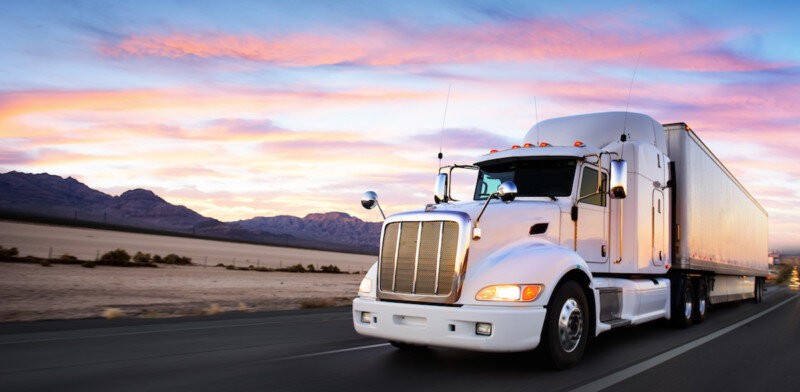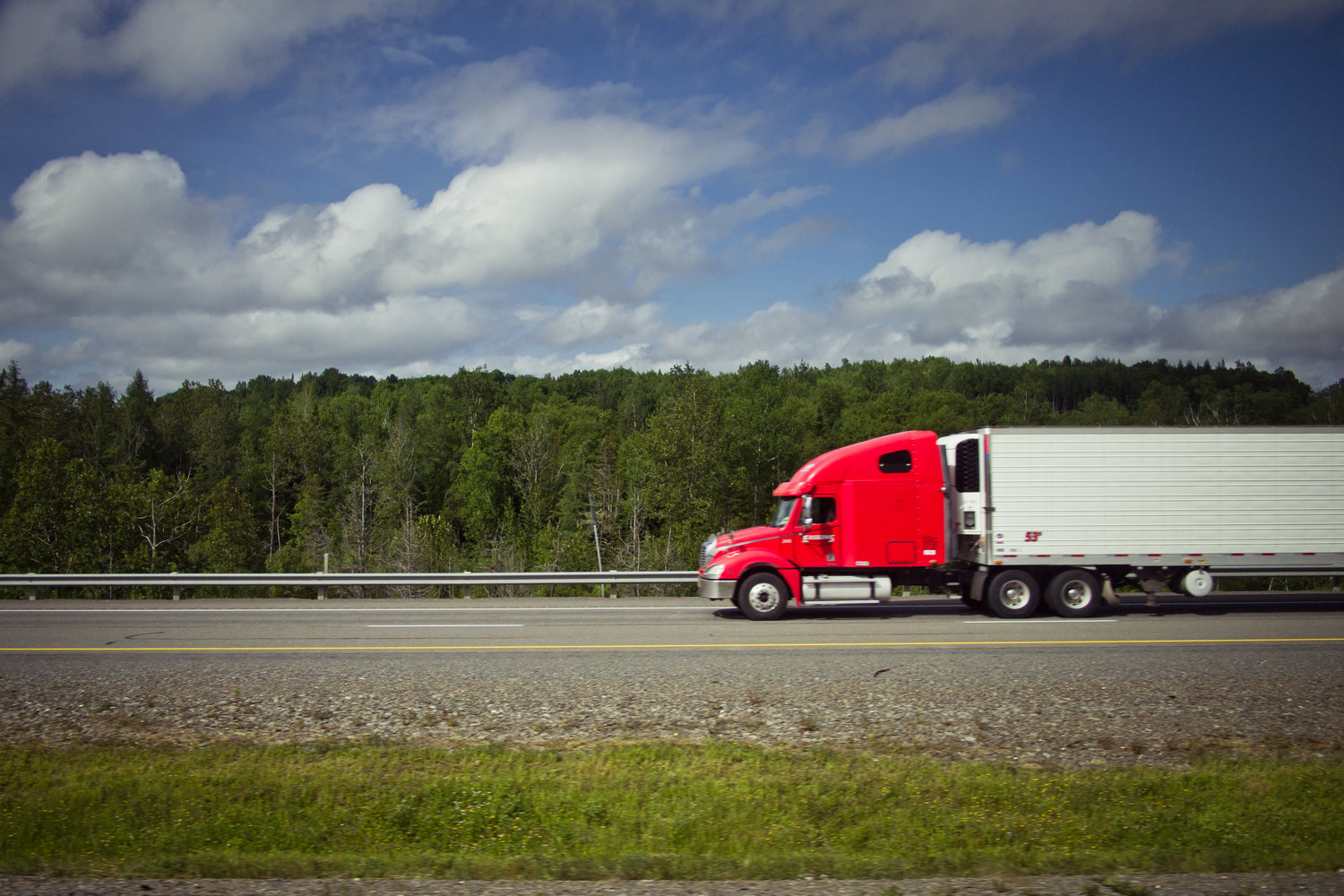Many of America’s largest truck companies started with drivers, trucks, and their dreams. Like any other business, the trucking business is challenging, and success is often long-awaited. But it is possible. The basic steps to start a trucking business are the same whether you start with one truck or a fleet.
The trucking and cargo transportation sectors contribute significantly to the American economy. Professional drivers and established trucking businesses keep the industries that rely on them running as perishable, nonperishable, and construction-related goods make their way across interstates and highways.
This article will discuss detailed steps to start a Trucking Business . Also, you can find trucking industry trends and forecasts. So stay with us till the end.
Having the right tools and information can set you up for future success, whether it takes decades or months to decide that you want to start a trucking business. We’ll show you how to begin a trucking company with practical advice and step-by-step instructions in this guide.
What Is A Trucking Business And What Does It Do?
Within the trucking industry, there are numerous business models. A trucking company can consist of one truck with one owner or thousands of trucks operated by one company but guided by several drivers. According to the United States Labor Department, a truck transports roughly 70% of everything you wear, eat, use, or enjoy at home, school, or work. It is also a truck that usually uses parts and raw materials to manufacture them, from the supplier to the manufacturer and the store of purchase.
Various trucking companies specialize in hauling different goods from one location to another. Furthermore, businesses may collaborate with the precise distribution of activities centers to pick up new commodities by truck. A few companies even provide efficient, fast truck delivery in crucial parts of the country.
Trucking Industry Forecasts and Trends
The trucking industry, as a whole, faces the same challenges as other industries such as manufacturing, wholesaling, and construction. Transportation of goods, products, and materials often depends on economic and cultural trends. While this is true, organizations such as the American Trucking Organization consistently release statistical data on trucking trends that may influence business decisions.
Revenues increased nationally in 2018 compared to the previous year. Trucking companies transported 11.5 billion tonnes of freight in 2018.
There were at least 1,300 new trucking jobs in 2019 due to shortages or other transportation needs.
Start a Trucking Business In 8 Easy Steps
The trucking industry is vital to the everyday use of commodities and products in the United States. If you want to start a trucking company, the potential gains and opportunities for growth are enormous.
By following the steps outlined below, you will be better prepared to initiate your company with the proper framework.
Step 1 – Experience, Research, And Planning With Purpose
Veteran owner-operators frequently advise newcomers to the trucking business to enhance their truck driving experience as corporate drivers before rising to the challenge of commencing a trucking company.
Why? As a result, new drivers in the trucking industry tend to make rookie mistakes quite often, such as getting stuck, backing into things they shouldn’t, and other accidents.
If you want to learn how to start a trucking business, you might already have experience in the industry. You can use this knowledge to build a foundation for your business, whether you’ve worked in an administrative or distribution position or if you’ve been a trucking company driver.
The profitability of your business begins long before you purchase a truck, sign clients, or start delivering packages. Indeed, the more you learn about regulations, assets, expenses, and industry requirements, the better you will be able to serve your customers in the long run. In addition to learning to operate a large truck, you must also learn to successfully run your trucking business, which has its steep learning curve. What are the benefits of getting skills before starting your own business?
- Large trucking companies provide inexperienced drivers with the training and support needed to become successful truck drivers.
- Large carriers can easily bear the costs of errors that would put an unpracticed driver out of business if they started their own company.
- You can concentrate on learning how to function safely and with federal regulations.
- You will learn how to work under pressure while adhering to hours of service regulations.
- You will become acquainted with the costs of operating a commercial vehicle in terms of upkeep, fuel, etc.
- You will understand the business by conducting research, reading trade journals, and participating in social media discussions.
- You can begin building your network of other drivers and shippers, which will be beneficial when you kickstart your trucking company.
- You can learn about the country’s freight lanes and make informed choices regarding the cargo your future trucking company will transport.
- Working for a big company first helps determine whether trucking is the perfect career for you before investing large sums in starting your own trucking company.
Driving for a founded carrier for two to three years is an opportunity to invest in the victory of your potential trucking company. After gaining experience, you’ll know the next step in starting a trucking company—creating a business plan.
Step 2 – Setting Up A Business Place And Structure
Beginning a trucking business isn’t something you do on the spur of the moment. Before launching your operation, you must have a solid plan to ensure success. After you’ve completed some basic brainstorming, it’s necessary to switch on to the business plan of your trucking company. A business plan includes:
- Industry-exclusive value proposition
- Realistic company growth objectives
- An overview of income and expenses
- Hiring and employment strategies
- Asset list and financial information

When creating your business plan, there are numerous factors to consider. Here are a couple of examples:
- Determine the niche in which you will specialize (dry van, tanker, flatbed, etc.)
- Investigate the upkeep costs and reliability of power units (trucks). Repair shops charge varying fees depending on the engine and manufacturer. You can cut your operating costs by striking the right balance.
- Determine the requirement of any special permits or CDL endorsements, for example – hazardous substances, bulk liquids, etc.
- Calculate how much money you’ll need to set aside for operating costs and routine maintenance like new tires, oil changes, and gas.
- Will you cover all 48 states or concentrate on a smaller area? When it comes to the cost of state-specific permits, this is important
You can also make a 3-5-year business plan to see where you’re going. Business plans typically include the following:
- Extensive Summary – Describe your company and its mission in detail. Also, determine how you plan to accomplish your objectives.
- Company Description – Describe what your company does, its mission, and how it differs from others.
- Operations – Everything concerning your company’s ‘how,’ such as technology, personnel, and systems for daily operations.
- Services – A clear understanding of what you intend to provide your customers will be apparent to them.
- Market Analysis – Examine today’s market and how your company will fit into it.
- Sales And Marketing – A game plan for attracting customers.
- Financial Projections – Determine realistic revenue and profit targets and how you will achieve them.
These are only a few ideas for planning. Remember that the more research you conduct, the better your plan. Once you’ve established your strategy, it’s time to get started on the paperwork.
Step 3 – Securing Paperwork Including Licences And Certifications
The trucking industry has immense potential for new entrepreneurs, but it’s also very regulated. Most experienced drivers understand that having the proper licenses and legal certifications allows you to stay in compliance. The truck industry regulates the federal and state governments and requires a large amount of paperwork, including:
- Establishment Of The Business Entity – Incorporating ensures that your business constructs and effectively segregates your professional and personal life. It involves deciding on a company name and obtaining an EIN (employer identification number) from the IRS (Your EIN is similar to your social security number for your company. It works for opening a business bank account and tax filings.)
- Acquire Licenses And Permits – Pertinent to your planned operations and cargo type. You will, of course, need your CDL. However, your USDOT number and BOC-3 filings are necessary licenses and permits.
- Acquire Motor Carrier Operating Authority – You have two choices. The first step is to acquire your jurisdiction, which can be costly. The filing fee is $300. The second alternative is to drive under the MC authority of another company.
- Commercial Driver’s Licence – All commercial truck drivers are required by law to have a CDL. Because this is a common requirement, there are numerous ways to meet it through local classes and other resources. Even if you don’t drive a truck as a trucking company owner, your CDL must be updated.
Before beginning business operations, it is critical to complete all required paperwork and pay all fees to get your trucking company off to a good start.
Step 4 – Purchase Necessary Equipment And Vehicles
It’s a good idea to consider a new line of credit because you’ll need to make several purchases, including tractors, trucks, maintenance equipment, and business licenses. It enables you to meet the needs of your new business while safeguarding your cash assets.
The two crucial aspects are:
- Is the vehicle capable of transporting the cargo you intend to transport?
- Is it better for your company to buy or lease?
Here are some suggestions for buying a truck:
- Older equipment is less expensive to purchase but more costly to maintain than newer equipment.
- If you have been a company driver for a couple of years, you have a better idea of your needs and a network of fellow drivers and truck mechanics to consult before completing your equipment purchase.
- Look for a truck model with a track record of good fuel economy, longevity, and logical maintenance costs.
You can’t afford to cut corners on poor equipment or materials in a highly regulated industry like trucking. Vehicle dependability is critical for safety, customer trust, and business growth. Make sound truck purchases while remaining compliant.
The Federal Automobile Carrier Safety Management Authority is a fantastic resource for learning more about detailed registration and policy specifications for truck drivers and owners.
Step 5 – Secure Insurance Coverage
Before you start your trucking business, make sure you’re fully insured. There are various types of business insurance, so take your options into account and select what is best suited for you:
- Primary Liability – To compensate for damage or injury caused by your negligence.
- Cargo – To requite cargo damage or theft.
- Physical Damage – To cover damage for which you are not responsible.
- Passenger Accident – To cover passenger injuries in your truck
Step 6 – Hire a Team, Get Loads, And Grow Your Business
Hiring a team to serve your growing client base is one of the final steps in your business-building journey. An executive or leadership team, a fleet or team of truck drivers, administrative and office personnel, liaisons to distribution facilities, freight and cargo specialists, marketing, sales, and other business personnel may comprise a full-fledged trucking company team. Hiring a few dedicated sales and marketing team members may be crucial to starting your business. Your company’s success will necessitate a concerted effort from several people with diverse backgrounds, skill sets, and levels of industry experience.
After completing steps one through five, it’s time to start earning money by getting loads. To summarise, you have three choices for finding a load as an owner-operator:
- Load Boards – These are categorized advertisements for the trucking industry. Owner-operators can choose from loads posted by shippers and brokers.
- Shipper Relationships – If you haven’t been networking with shippers ahead of time, this method may cause additional delays in receiving your first load.
- Freight Brokers – A surefire way to find a load, but expect to give the broker 25% to 50% of your load revenue.
You will need a large cash reserve because it can take up to 45 days to get paid for your first load. It’s vital to consider how freight transactions are processed and what causes delays. You must also plan for and cover your expenses while waiting for these accounts to settle.

Step 7 – Necessary Funding, Finances, And Managing Your Business
A commercial trucking company requires startup costs, and this is something you should factor into your business plan. If you don’t have the money in a private account, you need to find investors or look into business loans.
When your business starts, you should be proactive about your financial requirements. Managing accounts, expenses, and more with a streamlined accounting system designed for business holders and truckers can make your life easier.
It’s only half the battle when it comes to moving your cargo. Ensure everything is running smoothly by overlooking your company’s operations. Spend time expanding your industry knowledge and cultivating good management habits.
Step 8 – Maintaining Compliance
Compliance with state and federal regulations is critical for long-term success.
- Keep track of all license, permit, filing, and insurance expiration and renewal dates.
- Make sure the documentation you need to keep on board your truck is readily available and easy to remember.
- Maintain secure vehicle operations, including adhering to operating hours, weight limits, and other safety requirements. Failure to do so can hurt your CSA safety score and make hauling loads for certain shippers impossible.
When you’re on your way to a scheduled pick-up, the last thing you want is to be taken out of service for non-adherence and fined heavily. It can harm your customer relationships, increase costs, and promptly put you out of business. It’s a potential issue to address by simply evaluating your legal documents regularly.
Conclusion
Allow existing competition and current difficulties to motivate and accelerate you toward success as you launch your new business. Although you may face some initial challenges, learning to overcome them will strengthen your tenacity, perseverance, and attitude. As your trucking business grows, you might discover yourself advising others who want to start their own!
Frequently Asked Questions
Q: What type of truck should I purchase or lease for my trucking business?
A: The type of truck you should purchase or lease for your trucking business will depend on the type of freight you plan to transport, as well as your budget and personal preferences.
Q: What are some financing options available for starting a trucking business?
A: Financing options available for starting a trucking business may include traditional bank loans, Small Business Administration (SBA) loans, equipment leasing, and crowdfunding.
Q: How can I find shippers and brokers to work with for my trucking business?
A: You can find shippers and brokers to work with for your trucking business by networking with industry professionals, attending trade shows and conferences, and using online load boards and freight matching services.
Q: What are some common challenges faced by trucking businesses?
A: Some common challenges faced by trucking businesses include rising fuel costs, competition from other carriers, driver shortages, and compliance with federal regulations.
Q: What are some strategies for managing expenses in a trucking business?
A: Strategies for managing expenses in a trucking business may include optimizing fuel efficiency, minimizing idle time, conducting regular maintenance and repairs, and negotiating favorable rates with shippers and brokers.
James Johnson is a former truck driver who now works as a writer, specializing in the trucking industry. With over 15 years of experience on the road, James has a unique perspective on the challenges and opportunities faced by truck drivers and the trucking industry as a whole. His writing focuses on issues such as safety, regulation, and the latest industry trends. His work has been featured in several trucking publications and he has received recognition for his contributions to the industry. In his free time, James still enjoys being around trucks and often attends truck shows and other industry events.


